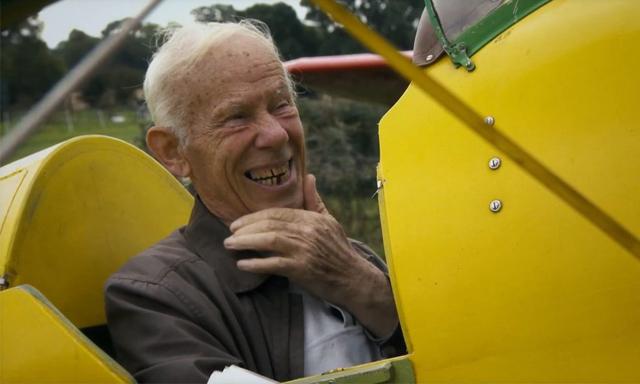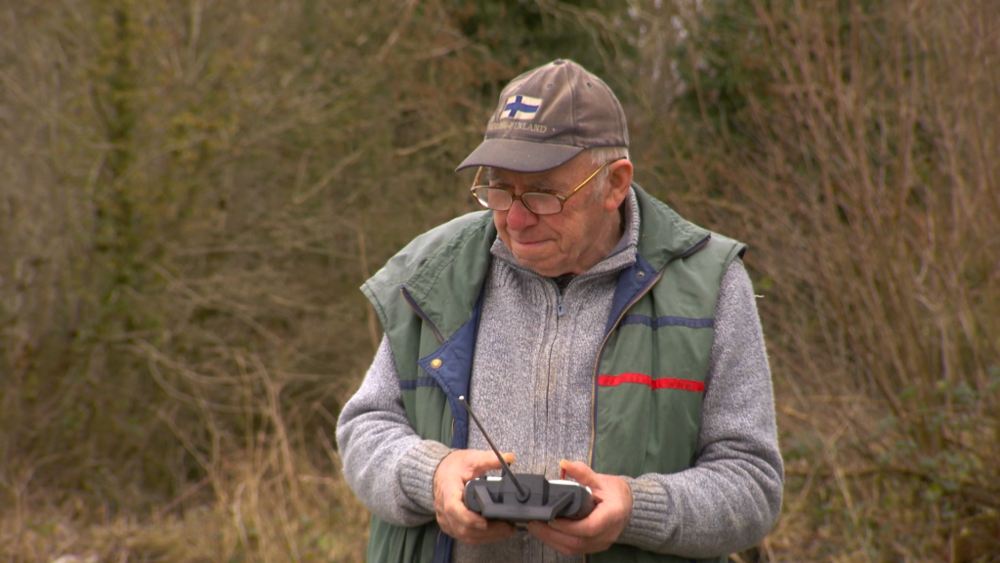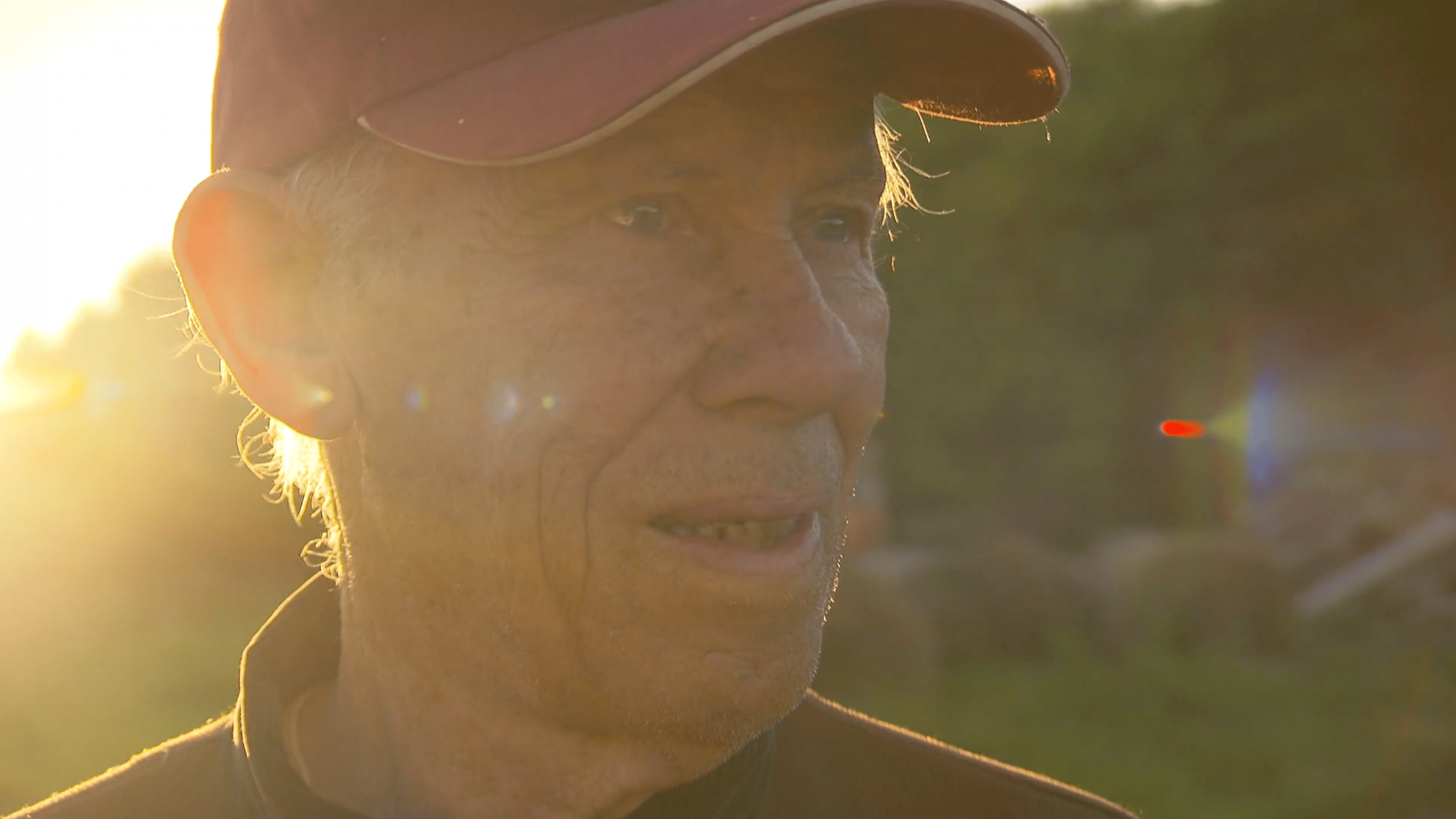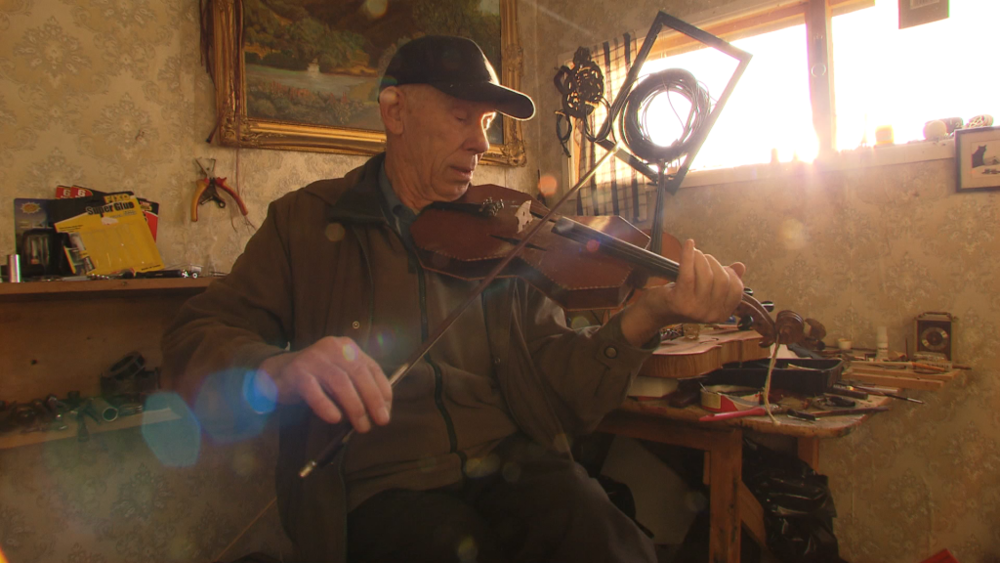Quite possibly the feel-good movie of the year, 'The Man Who Wanted to Fly' follows two 80-something-year-old brothers living a quiet life in Cavan. One of the pair, Bobby Coote, dreams of taking to the sky. His brother Ernie thinks it’s a daft notion and that Bobby is much too old to be flying.
We chatted to Frank Shouldice, the director behind the Irish doc, ahead of the release of 'The Man Who Wanted to Fly'. Frank tole us about where the idea for the movie came from and why it deserves to be seen on the big screen with an audience.
So ‘The Man Who Wanted to Fly’ hits cinemas nationwide but the film has screened at so many places already. It's been to Galway Film Fleadh, Guth Gafa, the IFI Documentary Festival, Kerry, Clones. Was there a particular place that was your favourite to screen it in?
Well the premiere was at the Film Fleadh and at each festival it was meant to be a one night only thing. However, a few of them turned into a few nights only because there was such demand, and that was really gratifying. You know really we were thrilled that there was that response because, for Dave Perry and myself, this started five and a half years ago from the first day of filming to literally the final moment of editing and wrapping it up.
So you know then you're bringing it out and it's never seen the light of day. I actually thought there was something in it from a very early stage but then the test is when audiences come in. And the reaction we got was just great.
There was one particular audience in Guth Gafa in Kells. What happened was it sold out. Now Kells is beside me so there was a lot of interest that had kind of percolated as it did about the two boys. So they added a second screening and that sold out. And up to that point nothing else had sold out. So they said we have one other slot and it's the only time we have because everything else is full. And it half ten on Sunday morning. So we thought sure even if we get 30 or 40 people that'd be great. You know it’s a late addition. But it sold out as well and that in particular stands out for me. There was just such an atmosphere. There was something in the air or some mood or feeling within the audience there right from the beginning and they actually burst into spontaneous applause before the end. There was nothing fake or made up about it. It was absolutely real.
Each screening has its own sort of appeal or charm or something that you remember. Like when we went to Clones it was the first time in 20 years since they began the film festival there that they'd sold out two screenings of the same film on the same day. It's also about the encounters that you have afterwards and after that the screening in Clones, this man, his wife and their teenage son came up. They were from Monaghan and they said they had actually seen the film in the IFI already and he said it's the first time ever he’d gone to a film twice. So obviously I was thrilled and kind of moved and then his wife said you know it's very unusual for us to go out as a three. When the parents told their son they were going to go to see the film in Clones, he said he wanted to go as well. So I asked him like what did you make of it. He said it's class, and you know when you get that response, it's kind of unvarnished. It's a straight response, there's no clever gimmickry about it. And again, we're really glad about that. It seems to appeal across all ages and men and women as well. It doesn't matter where you're from either. People are taken aback at how much it hits them and we've had a lot of people in tears through the screenings because it brings memories to them.
It's amazing to see how far it's come. Going back to the very beginning I was wondering how did you first meet Bobby and Ernie and at what point did you come up with the idea to make a documentary?
Dave Parry and I had worked on a lot of things, especially current affairs, together and we were looking for a project that we would do ourselves on our own. Dave is into flying and he was actually flying near his home in Bailieborough. And when he was up in the sky, and it's a really small plane he has, he noticed this white dot underneath. When he landed, he went home and there was a ring at the bell. He opened the door and there was this man wearing a baseball cap, an elderly man, and he saw his car behind him and it was a white Suzuki IQ so he realised this is the dot that's been following me all over the place. The man at the door turned out to be Bobby and he says to Dave "was that you up there in the sky" and Dave said it was, wondering who is this fella. Then Bobby explained this lifelong ambition. So that was literally the first spark of it because we were looking for something. Nothing had really panned out. And then when Dave told me about that it was intriguing and kind of magical because the pursuit of a dream has its own kind of romance.
What really turned it for me was when I learned that Bobby lived at home with the brother and they were two bachelors living in a fairly remote part outside Bailieborough and that they lived completely independently to the point that they'd two separate front doors. For me the flying idea is brilliant, it's really great, but if we can get the other brother on board then we're really onto something. So then it was a matter of meeting Ernie and Bobby and saying "this is what we're thinking of." And they ran with it and it began from there. The richness for me is all about what the brothers bring to it because it gets us into a deeper theme. They welcomed us in but if Ernie hadn't been prepared to come aboard, it might have been a short film. I don't think it would've had the same kind of rigour. It made all the difference and gave the film two main characters, not just one. It's quite telling actually that even though it is ‘the man who wanted to fly’, people talk about the brothers.
I was really struck by that in the film too, that even though he's not the titular man who wanted to fly, Ernie is such a big part of the story. What I found really interesting was the fact that Ernie wasn't encouraging of his brother at all. He was actually the exact opposite. So often in documentaries if someone has a dream, everyone's rallying behind them, saying you can do it. But Ernie is the exact opposite.
They see things quite differently. But there is a symbiosis to the relationship even though they live separately, independently, that they are there for each other when needs be.
Was there ever a worry that Bobby wasn't going to be able to achieve his dream and that your documentary would be just left hanging there? I always wonder if there's some kind of fear as a documentary filmmaker to know where to end the story.
It was a genuine concern because there was absolutely no certainty about it from the start. It was a dream he had. There was a kind of a parallel process going on because Bobby's dream is quite straightforward in one way, while our ambition was to make a documentary. So when his ambitions floundered, in a way so did ours. There was nothing written on the tin as to how this was going to pan out so that did create its own challenge. We were not looking for some kind of a twee happy ending. If it's not real, it's not going to work. So if he can't do what he's set out to do, where does that leave us with the film? And it was most definitely an ongoing question because going back to that time span of five and a half years, there could be (and in the end there was) over a year in which very little happens and you wonder, what is going to happen with this? How do you resolve something where the dream is frustrated or if you make a documentary about what would ultimately be a disappointment, how are you going to make that appealing? And there was no easy answer to that to be honest because it had to follow like his pursuit and if his pursuit didn't get him where he wanted to go, it would have been a different film.
There's a lack of control on your end as well because there's only so much you can do in filming it.
Well if it doesn't happen you can't film it. In the year where nothing happened, we saved plenty of stock that year. I think we'd probably leave it to Beckett to dramatize nothing happening you know because it's all very well that Bobby sets out on this journey but what I got more and more interested in was the proverbial journey, that here he is looking to do this. But really the down moments were very, very low. They were low because as much as Bobby would still hold to the mantra of "I'm going to do it", as it went on, it began to look like the thing was just getting out of reach, you know?
You ask a really good question because I don't have an easy answer, I don't. I wouldn't give you a glib answer because there were serious questions, you know with age, with what could happen. Even in his training we wondered would he be all right. And then, if it doesn't happen, where does that leave us? That was a constant thing in the back of my mind in trying to tell this story. How romantic can failure be? I don't know how far you'd get with the pursuit alone. But as it panned out, the ups and downs of what Bobby went through is what audiences are really connecting with because I think we've all been there.
What was the biggest challenge of the shoot? Because I was thinking maybe it would've been the technical stuff, particularly that aviation footage in the film.
Well fortunately with the aviation shooting, that's Dave's specialty in away. Drone work has become far more commonplace than it was when we started this. At the time, Dave would have been one of the foremost drone operators in the country, and still would be, so it was great for us that there was no challenge on the technical end. The technology is quite remarkable but that was Dave. Dave Perry worked all that and did just a brilliant job with it.
I suppose the other key point is that for years, until one particular scene, the only crew was myself and Dave. It simplified things and also gave it an intimacy so it didn't feel like we were invading their space. Bobby and Ernie got used to us, they were comfortable. It's a lot to ask someone to bring a camera into their house and start documenting their lives. It would have been very new to them, although Ernie does like to remind me that Halls Pictorial Weekly went up there in the 70s or 80s and they filmed there for an afternoon program. He likes to tell us “you were up here for nearly five and a half years, almost every day - how come they could do it in an afternoon and it took you so long?”
How are Bobby and Ernie doing now? I'm guessing you're still in contact with them.
Yeah, very much so, yeah. It’s been shown there in Bailieborough and I think it's been a great novelty for them. Things have settled back to normal and yet I am suspecting that they're going into Bailieborough to be seen because they're being hunted in town on Main Street there and they've been approached a few times. Ernie once went in for some teeth and three people came up to him asking “Are you the man from the film?” Part of him was loving this and part of him was thinking "Jaysus".
I don't know if they realize that in the film, they do represent an awful lot of people, men especially, but not specifically, but more men I suppose, in the same boat. They represent similar stories from all over Ireland. There's something universal about it. They know fellas who don't come out that much anymore for a variety of reasons - age, drink driving, physical mobility, all of this - so there's less social activity there and less socializing going on at home. People are getting more isolated. And I think it may dawn on them somewhere that they've actually represented that story because this is where we live. You could even be in the city and be cut off or isolated. Some of the scenes are kind of heartbreaking that way. At one of the screenings actually, somebody wanted to invite Ernie to Christmas dinner. But it also prompted other people to think of others who might have been just forgotten about you know. It just may have opened up a bit of thought on issues that we might have just put to one side.
I think they’ve really enjoyed the experience. At Guth Gafa, they were getting very used to ice cream and champagne. I was telling them it won't be like this every day now. We opened a bottle of champagne just to mark the occasion and they loved it.
Final thoughts?
I'd add that there is some sort of a communal feeling that's generated when people watch this together so, you know, before it gets to TV, I would urge people to see it in the cinema when there's other people there. In Guth Gafa, it was just a beautiful atmosphere that made it special and there's the laughing but it also hits a lot of people. There are a lot of tears for people watching it too and audiences seem a bit restored coming out. We're not changing the world but this is what happens, it's humanity. And I think that's why the good word has been getting out from those who have seen it. You may think this is nothing but see for yourself.
'The Man Who Wanted to Fly' touches down in cinemas nationwide on March 29th.












































































